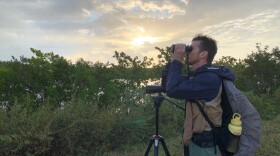
Jenny Staletovich
Environment ReporterJenny Staletovich has been a journalist working in Florida for nearly 20 years.
She’s reported on some of the region’s major environment stories, including the 2018 devastating red tide and blue-green algae blooms, impacts from climate change and Everglades restoration, the nation’s largest water restoration project. She’s also written about disappearing rare forests, invasive pythons, diseased coral and a host of other critical issues around the state.
She covered the environment, climate change and hurricanes for the Miami Herald for five years and previously freelanced for the paper. She worked at the Palm Beach Post from 1989 to 2000, covering crime, government and general assignment stories.
She has won several state and national awards including the Scripps Howard National Journalism Award for Distinguished Service to the First Amendment, the Green Eyeshades and the Sunshine State Awards.
Staletovich graduated from Smith College and lives in Miami, with her husband and their three children.
Contact Jenny at jstaletovich@wlrnnews.org
-
Under the order, residents are reminded to follow local rules that restrict lawn watering to twice a week, before 10 a.m. and after 4 p.m.
-
Miami-Dade County Mayor Daniella Levine Cava said Kelly Tractor's plan to build new headquarters on 246 acres outside the urban development boundary failed to protect valuable wetlands and circumvented planning rules designed to protect them.
-
State and federal officials who had been scheduled to attend the conference in Naples this week said Wednesday they would not attend, leaving organizers scrambling to replace speakers.
-
County Commissioners agreed to amend its growth plan to allow Kelly Tractor to build outside the urban development boundary put in place decades ago to protect wetlands and farms.
-
A proposal to build a sprawling heavy equipment depot on protected wetlands outside Miami-Dade County’s urban development boundary, and adjacent to some of its most flood-prone neighborhoods, is drawing opposition from county planners and environmentalists.
-
According to a new study and hundreds of videos shot mostly in waters near Palm Beach County, manta rays can act as a mobile home, providing food, shelter, even honeymoon suites for fish in sometimes inhospitable waters.
-
The stowaways were discovered hanging out in a leafy park on one of the world’s largest cruise ships after it left PortMiami earlier this year on a trip bound for Spain. Why the pint-sized birds that normally favor solid ground wound up sailing the high seas remains a mystery.
-
Visitors greeted by a trailer after Hurricane Irma destroyed a temporary center in 2017 now will be welcomed by a storm-resilient modern visitor center with sweeping views.
-
Twenty-five Kemp's ridley sea turtles, considered the rarest among sea turtles, arrived in the Keys Tuesday after being rescued from frigid water off New England.
-
The century-old count is one of the longest, continuous data sets on record, providing details about shifting migrations and floundering populations.
-
Over his short life, Daniel Weisberger went from Boy Scout and beloved older brother to killer. To understand why, we headed to the Florida Keys, where Daniel’s world unraveled. WLRN's special report 'Keeper and Killer' looks at mental illness and the criminal justice system through the family's story. What starts as a cautionary tale has an end that is far from expected.
-
Over his short life, Daniel Weisberger went from Boy Scout and beloved older brother to killer. To understand why, we headed to the Florida Keys, where Daniel’s world unraveled. WLRN's special report 'Keeper and Killer' looks at mental illness and the criminal justice system through the family's story. What starts as a cautionary tale has an end that is far from expected.










